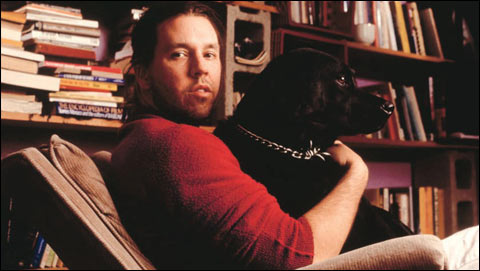
EDITOR, PLEASE Lipsky barely shapes his transcripts of conversation, except for occasional self-conscious commentary. |
| Although of Course You End Up Becoming Yourself: A Road Trip with David Foster Wallace | By David Lipsky | Broadway Books | 320 pages | $16.99 |
David Foster Wallace had a crush on Alanis Morissette. He drank Diet Rite soda by the case. David Lynch changed him. He loved Braveheart (David Wallace — William Wallace). When he was on suicide watch at McLean Hospital in Belmont in 1989, the room they put him in was pink and empty and had a drain in the center of the floor.Such are the details, among many others, from Although of Course You End Up Becoming Yourself, five days’ worth of interviews David Lipsky conducted with Wallace for Rolling Stone during the final week of the publicity tour for Infinite Jest in 1996. That piece never ran, but, following Wallace’s suicide in September 2008, a 2009 Lipsky piece about him won the prestigious Profile Writing Ellie for Rolling Stone. And now, we have a book that takes the form of unedited transcripts. Lipsky and Wallace talk about television and Stephen King and R.E.M. Wallace bashes John Updike and lies about his depression. They talk a lot about fame and addiction. They talk some about writing. Wallace: “I think that there is, in writing, a certain blend of absolute naked sincerity and manipulation.” It’s an observation that applies especially to this book.
Apparent from the start is Lipsky’s sincere, naked adoration of Wallace. This is from the thoughtful “afterword”: “He’d done a thing that was casual and gigantic; he’d captured everybody’s brain voice.” In terms of manipulation, however, Lipsky’s a reporter. He needs Wallace to say certain things, and Wallace knows this — “I’m structuring it as a sound bite,” he says of one of his own comments. For Wallace, says Lipsky, “The key to writing is learning to differentiate private interest from public entertainment.” But Lipsky can fail to differentiate, and the book often feels like fame-mongering exploitation.
Lipsky peppers the conversation with stage business (“Long pause,” “Beeper on his watch keeps going off”) and his own observations and asides — which can seem like lazy, self-conscious interruptions. Wallace talks about the “magical stuff that fiction can do for us.” He goes on about “the sense of capturing, capturing what the world feels like to us, in the sort of way that I think a reader can tell ‘Another sensibility like mine exists.’ Something else feels this way to someone else. So that the reader feels less lonely.” To which Lipsky adds: “ ‘Lonely’ again; interesting.”
Lipsky also feels the need to translate Wallace’s colloquialisms and then provide the original: “I read something (‘sumpin’ ’).” It’s just one more distraction, along with the parentheses, the square brackets, and the italics, in a book that has an “introduction,” a “preface,” and an “afterword” — all before the text starts. He even has to point out that the colloquialisms are catching, after asking, “I remember trying to write some book when I was in high school during that McEnroe-Borg tiebreaker at Wimbledon. Was it like ’81 or somethin’ like that? [His speech fully infiltrating mine.]”